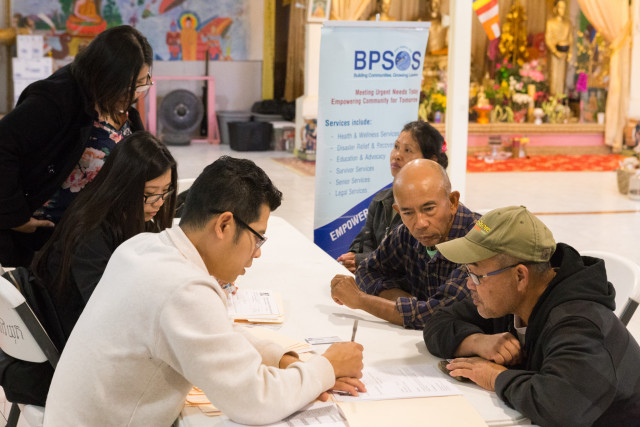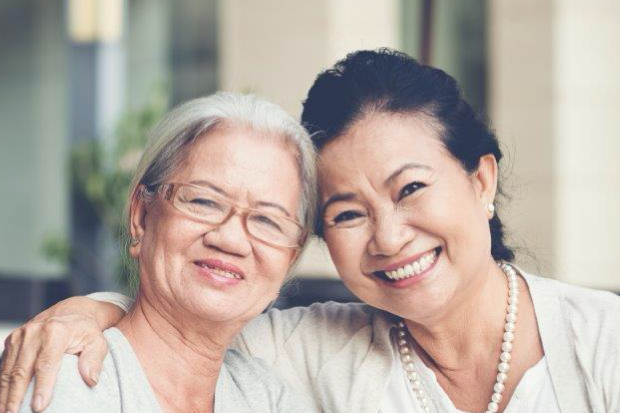Last month, I had the opportunity to attend a focus group with Vietnamese family caregivers in Houston, Texas. During the focus group, I learned more about their caregiving experiences, their challenges, and the changes they would like to see in the U.S. healthcare system. Here are some of the things I learned.

Volunteers and staff of Boat People S.O.S. – Houston help Vietnamese older adults complete paperwork at an event in Houston. (Photo courtesy of BPSOS)
“Very thankful for my parents, but sometimes it can be hard to please them, especially when dealing with right and wrong because of our cultural values.” – focus group participant
Cultural Values Influences Caregiving Expectations
In the Vietnamese community, traditional values have a big impact on caregivers. Traditional values such as filial piety — respect for one’s parents, elders, and ancestors — influence many Vietnamese caregivers to exclusively focus on their loved one’s health regardless of their own health. This also means that Vietnamese older adults and caregivers are less likely to use in-home health services since the same level of care is expected from family members and adult children. Without the use of in-home health services, older adults are usually alone during the day, making it difficult for Vietnamese caregivers to manage their own work responsibilities. Vietnamese caregivers in this focus group reported having to frequently take time off from work to manage caregiving responsibilities.
“When I am at work, I can never be at peace. I’m worried something will happen and my parents won’t be able to do anything to [care for] themselves. I am never able to fully focus at work.” – focus group participant
There is a Need for Accessible and High-Quality Translation Services/Translators
As many Vietnamese older adults are of limited English proficiency, the caregivers in this focus group reported that they were responsible for navigating multiple healthcare systems. Vietnamese caregivers are expected to be responsible for translations during doctor appointments, home health visits, insurance calls and many more occasions. The linguistic challenges of Vietnamese older adults compound the stress burden of Vietnamese caregivers as they are fearful of someone taking advantage of their loved ones when no one is there to translate for them. Even when professional translation services are offered in the healthcare setting, Vietnamese caregivers in this group reported dissatisfaction and frustration, as translators fail to convey their loved ones’ needs and concerns to healthcare providers.
“Communication is very hard because I tried to call into health care providers to let them know I changed my address, but it took two hours when it should have taken five minutes, all due to miscommunication and language barriers. They make it very complicated to help them to help us. They are so strict, they only demand to talk to the patient…. Even with a translator, the message is not clear at times, and the message doesn’t get passed along.” – focus group participant

Vietnamese family caregivers struggle to manage work and life responsibilities while also providing high levels of care for their loved ones. (Photo: Adobe Stock)
Vietnamese Caregivers Want to be Acknowledged
Cultural values and linguistic challenges compound caregiving responsibilities, making it feel like a never-ending job. Vietnamese adult children are often expected to be the sole provider of care for their parents, and yet they receive little to no formal support or training. Similarly, Vietnamese older adults rely on their children and loved one for translation services yet they are not acknowledged by healthcare providers. Yet, when asked about what more help they needed to provide the care that they do, the caregivers in this focus group expressed a desire to be better trained. They still want to be caregivers; they just want to do so with all of the tools they need to be a good caregiver. The caregivers in this group also wanted their role as caregiver to be acknowledged by healthcare providers for both their care recipient and themselves.
“I would like the insurance/healthcare providers to also include the caregiver’s input and opinion as it is the caregivers who know more and best.… It is the caregiver who is taking care of them and knows what is needed. The healthcare providers need to hear from all perspectives in order to give better service.” – focus group participant
This focus group was hosted in July 2019 by Boat People SOS (BPSOS) Houston, an organization dedicated to helping refugees. Historically, BPSOS Houston focused on Vietnamese refugees, however, over the last decade, BPSOS Houston has expanded their services to aid a diverse client base of immigrants, refugees, victims of trafficking, disadvantaged students, and survivors of violence. In addition to their direct services, BPSOS currently operates in eight different U.S. locations and three countries with a focus on leadership, advocacy and empowerment. It was an honor to be at BPSOS to listen to Vietnamese caregivers in the community.
The Diverse Elders Coalition’s caregiving research is generously supported by The John A. Hartford Foundation. This focus group is one of a nationwide series of focus groups with family caregivers in communities of color, LGBT communities, and American Indian/Alaska Native communities. Read more about our work to better understand diverse family caregiving issues.
The opinions expressed in this article are those of the author and do not necessarily reflect those of the Diverse Elders Coalition.
